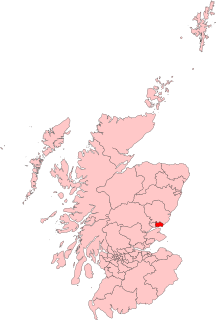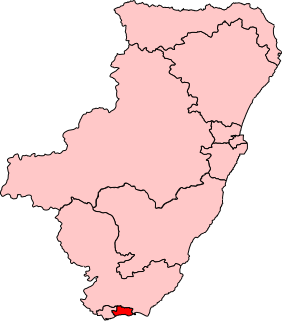
Angus is one of the 32 local government council areas of Scotland, a registration county and a lieutenancy area. The council area borders Aberdeenshire, Dundee City and Perth and Kinross. Main industries include agriculture and fishing. Global pharmaceuticals company GSK has a significant presence in Montrose in the north of the county.

The Local Government etc. (Scotland) Act 1994 is an Act of the Parliament of the United Kingdom which created the current local government structure of 32 unitary authorities covering the whole of Scotland.

Dundee East is a constituency of the House of Commons of the Parliament of the United Kingdom. Created for the 1950 general election, it elects one Member of Parliament (MP) by the first-past-the-post voting system.

Dundee West is a constituency of the House of Commons of the Parliament of the United Kingdom. It elects one Member of Parliament (MP) by the first-past-the-post voting system.

Angus was a constituency of the Scottish Parliament (Holyrood). It elected one Member of the Scottish Parliament (MSP) by the first past the post method of election. Also, however, it was one of nine constituencies in the North East Scotland electoral region, which elects seven additional members, in addition to nine constituency MSPs, to produce a form of proportional representation for the region as a whole.
Scottish Westminster constituencies were Scottish constituencies of the House of Commons of the Parliament of Great Britain, normally at the Palace of Westminster, from 1708 to 1801, and have been constituencies of the House of Commons of the Parliament of the United Kingdom, also at Westminster, since 1801. Constituency boundaries have changed on various occasions, and are now subject to both periodical and ad hoc reviews of the Boundary Commission for Scotland.

Dundee City East is a constituency of the Scottish Parliament (Holyrood). It elects one Member of the Scottish Parliament (MSP) by the first past the post method of election. Also, however, it is one of ten constituencies in the North East Scotland electoral region, which elects sevenadditional members, in addition to ten constituency MSPs, to produce a form of proportional representation for the region as a whole.

Dundee West was a constituency of the Scottish Parliament (Holyrood). It elected one Member of the Scottish Parliament (MSP) by the first past the post method of election. Also, however, it is one of nine constituencies in the North East Scotland electoral region, which elects seven additional members, in addition to nine constituency MSPs, to produce a form of proportional representation for the region as a whole.

Politics in the Dundee Citycouncil area are evident in the deliberations and decisions of Dundee City Council, in elections to the council, and in elections to the Scottish Parliament (Holyrood) and the House of Commons of the Parliament of the United Kingdom (Westminster).

Elections to Dundee City Council were held on 3 May 2007, the same day as the other Scottish local government elections and the Scottish Parliament general election.

Joseph Martin FitzPatrick is a Scottish National Party (SNP) politician serving as Minister for Public Health, Sport and Wellbeing since 2018 and Member of the Scottish Parliament for Dundee City West since the 2007 Scottish Parliament elections, succeeding retiring Labour MSP Kate Maclean. He also served as the Scottish Government Minister for Parliamentary Business, a post he held from September 2012 to June 2018.

Dundee East was a constituency of the Scottish Parliament (Holyrood). It elected one Member of the Scottish Parliament (MSP) by the first past the post method of election. Also, however, it was one of nine constituencies in the North East Scotland electoral region, which elects sevenadditional members, in addition to nine constituency MSPs, to produce a form of proportional representation for the region as a whole.
The Dundee West by-election was held on 21 November 1963 due to the death of the incumbent Labour MP John Strachey. It was won by the Labour candidate, Peter Doig.

Elections to Dundee City Council were held on 1 May 2003, the same day as the other Scottish local government elections and the Scottish Parliament general election.
Elections to Dundee City Council were held on 1 May 1973, the same day as the other Scottish local government elections. Of the councils 36 seats, 13 were up for election.

The 1992 City of Dundee District Council election took place in April 1992 to elect members of City of Dundee Council, as part of that years Scottish local elections.

The 1999 City of Dundee District Council election took place on 6 May 1999 to elect members of City of Dundee Council, as part of that years Scottish local elections.
The 1974 City of Dundee District Council election took place on 8 May 1974 to elect members of City of Dundee Council, as part of that years Scottish local elections.
The 1988 City of Dundee District Council election took place on 5 May 1988 to elect members of City of Dundee Council, as part of that year's Scottish local elections.

Elections to Dundee City Council were held on 4 May 2017 on the same day as the other Scottish local government elections. The election used the eight wards created as a result of the Local Governance (Scotland) Act 2004, with each ward electing three or four Councillors using the single transferable vote system. A total of 29 Councillors were elected.















